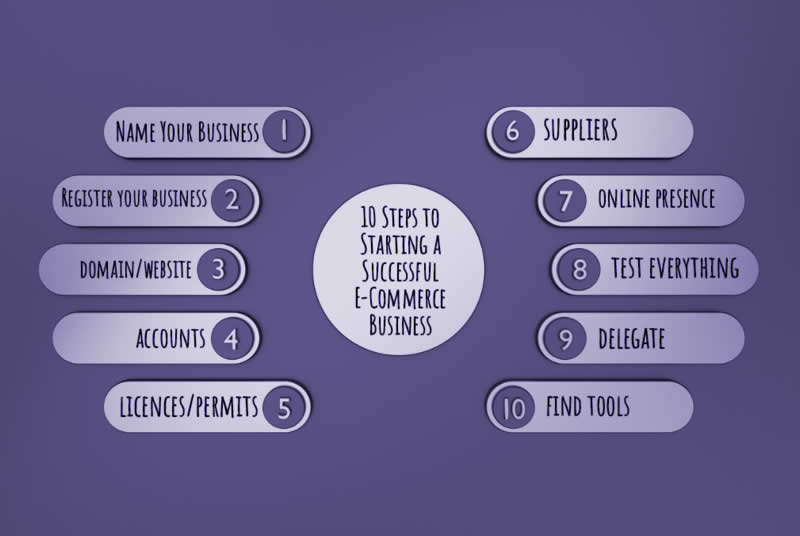10 Steps to Starting a Successful E-Commerce Business

Online shopping continues to grow in popularity, with more and more customers turning to the internet to look for the products and services they need. Starting an e-commerce business can be fairly simple to do, with low start-up costs and no need for a physical storefront location. If you are looking to launch an e-commerce business, there are a number of different ideas that are growing in online popularity. Here are just a few growing markets for online businesses:
- Web design – If you’re skilled with web design, not only can you get your own online business started easily, but you can then offer your services to others to create and maintain their website.
- Translations – When you speak multiple languages, starting an e-commerce translation business could be quite lucrative, and you already have the skills needed to get started.
- Clothing and accessories – When you are able to partner with great suppliers you can offer customers an online platform for buying clothing and accessories without having to stock inventory or deal with shipments.
- Phone accessories – Cell phones are constantly evolving, which means there are always new accessories that become available. With 70% of the Canadian population using smartphones, there is no shortage of available customers.
- Smart home devices – Every aspect of homes seems to be moving towards smart technology, from light switches to smoke detectors.
Once you’ve decided on what your business will be offering, you can get started on checking off these 10 steps to starting your successful e-commerce business:
1. Name Your Business
After you have established the nature of your business, you will want to choose a business name that is unique, memorable and lets your customers easily know what you offer. If you’re unsure if a business name is already in use, you can conduct a Pre-Search to look for existing businesses, corporations and trademarks across Canada.
2. Register Your Business
When you’ve determined what your business will be called, the next step is to register the business in the Province you’re located in. You can choose to either register as a small business or a corporation. There are some differences between small business registrations and corporations, so depending on how you want the business registered you can determine the best option for you and your business.
Ontario Business Central can assist with registering a small business in the following Provinces:
SMALL BUSINESSES
We can also assist if you’re looking to incorporate your business in any of these jurisdictions:
INCORPORATIONS
BRITISH COLUMBIA INCORPORATION
3. Get a domain name and website created
Now that your business name is registered, you can begin creating your online presence. You may wish to use your business name as the domain name, unless it is quite long or is tricky to spell, in which case you can choose something related to your business that’s easier for customers to spell. Because you’re an e-commerce business, you will want to put a lot of thought and effort into creating a website that is easy to navigate and visually appealing. There are ready to use website templates and easy to use website builders, like Wix, but you may want to look into having a custom website created, since it will be the foundation of your entire business.
4. Create any necessary accounts
After you have registered or incorporated your business, you can take your completed business licence or Articles of Incorporation to the bank to have them open a business bank account if necessary. As well, any accounts needed with Revenue Canada can be created either by yourself or Ontario Business Central can assist with registering these on your behalf.
5. Getting required business licences and permits
Even though your business is operating online, you may still need to obtain certain permits depending on the type of business you have, the business activity you are conducting and the region you are located. A great resource for finding out what permits you may need to get is BizPal, which lets you input your city and the type of business you have to determine what might be required.
6. Partnering with suppliers
If you’re relying on outside suppliers to fulfill your orders, it’s important to find a reputable company to partner with. Even though products and shipping may be handled by a supplier, it will be your business at the forefront of the customer experience, so if there are problems with inventory, shipping or quality, this would reflect poorly on your business from the perspective of the customer.
7. Expand your online presence
Make it as easy as possible for customers to find you online by having a broad online presence including an easy to navigate website and a strong social media presence. The easier it is for customers to find you and interact with you, the better experience they will have. Ensure any social media accounts are maintained and monitored so you can address customer questions and concerns quickly. There are great online tools, such as Buffer or Hootsuite, that can help you manage your social media accounts.
8. Test everything
Before sending out anything by email or letting anything go live online, make sure it’s first been tested. Check that any images appear properly, content has been proofread and links are all working. If you’re sending out emails, ensure that the fields being automatically input, such as the customer’s name, are functioning – nothing appears less professional than sending out an email addressed to ‘Dear {NAME}’.
9. Get more done by delegating
You likely won’t be able to get everything done by yourself, which is why it’s important to know what you’re capable of doing yourself and what can be delegated to others. Whether it’s skilled tasks that are better left to a professional or simple tasks that will divert your time away from where it may be better spent, there are a number of tasks that can be delegated.
10. Find tools to make business more productive
Whether it’s email marketing software, scheduling tools or accounting software, there are a number of resources you can utilize to make running your business easier and much more efficient. You will have plenty to do with running your e-commerce business, so the easier you can make each task, the better.
When you’re ready to get started, Ontario Business Central can help you in registering or incorporating your e-commerce business quickly and easily.
Should you have any questions, please feel free to reach out to our staff for additional information and assistance.
inquiries@ontariobusinesscentral.ca
Toll-Free: 1-800-280-1913
Local: 1-416-599-9009
Fax: 1-866-294-4363
Office Hours: 9:00am – 5:00pm
Monday – Friday E.S.T.
Ontario Business Central Inc. is not a law firm and cannot provide a legal opinion or advice. This information is to assist you in understanding the requirements of registration within the chosen jurisdiction. It is always recommended, when you have legal or accounting questions that you speak to a qualified professional.


